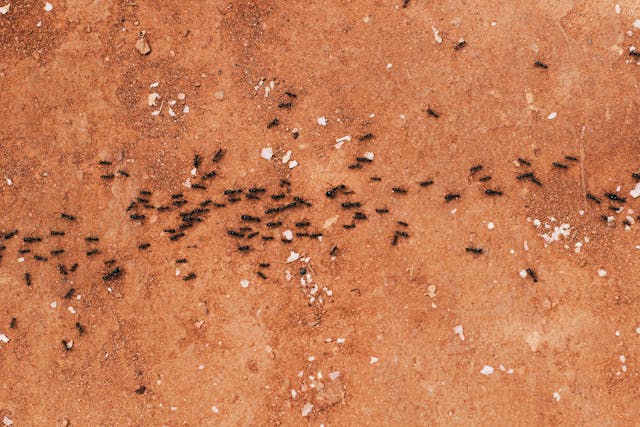
How do ants act as a superorganism? Ants are a superorganism because all of the individual ants function together as a single being. They all have different roles and functions, just like the cells in our bodies do.
Ants are not the only beings that act as a superorganism. Any species where all of the individuals act together as a whole can be termed a superorganism. Termites, bees, and wasps are more examples. Slime molds and fungus can also be classed as a superorganism because they connect together over large areas, working as an individual organism. There are other examples as well, but not all living organisms that work together are superorganisms. Humans, for example, work together as a species for (hopefully) the betterment of all, but we are not a superorganism because we don’t fulfill distinct and separate functions, as ants in an ant colony do.
The goal of an ant colony is to produce more ants, and to do that, all of the ants in the colony have to work together as a whole. It depends on the ant colony, but there can be as many as 20 million ants in a single ant colony. Sometimes, colonies can connect via tunnels and make supercolonies. One supercolony was even found with an estimated 300 million ants in it! Inside these colonies, all of the labor is divided up. This hierarchy can change depending on need and the age of the individual ants.
At the very top of the tree are the queens. That supercolony with 300 million ants had over a million queen ants! There are usually not that many, and often there is only one queen, or just a few. The job of the queen is to lay eggs, and she is therefore the most important ant in the colony. The queens are larger than the other ants, and they also live longer. Then there are male ants, called drones, whose only job is to mate with the queen and then die. They don’t do anything else. This is their only job. Then there are the workers. These ants make up the majority of any colony, and they do all the work that is necessary for the survival of the colony. The forage for food and bring it back to feed the colony and the larvae. They look after the queen’s eggs, making sure they hatch as healthy ants. They build new tunnels to expand the colony and get rid of any waste. And they defend the colony from predators. The younger worker ants act as guards for the queen, but as they get older they are relegated to going outside the colony to find food and fight off enemies. The older ants have more experience of the area around the colony, and they have more success finding food. Ants are called a superorganism because no type of ant would be able to survive without the other. They are all vital for the smooth functioning of the colony.
So, how do ants act as a superorganism? The way they divide up their jobs and how they all play a part in the machine is important, but the way they communicate and make decisions is also interesting. One way you can see this is by the way ants forage for food. Ants leave the colony and head out in random directions. They will keep searching for as long as they can before they need to return to the nest to get some more energy. Because ants are going in all directions, some of them will find food. When an ant finds food, it will carry as much of the food as it can carry back to the nest and lay a trail of pheromones as it goes. Other ants will find the pheromone trail, but it won’t be very strong, and they won’t be able to follow it directly. Some of them will go the wrong way, while some of them will find the food. The ones that find the food will carry some of it back and leave more pheromone trails. These trails will thicken until it is very easy for the ants to go directly from the nest to the food. The ants, acting independently, will have found the straightest route from the nest to the foo,d and this is how our brains make new pathways between the neurons. There have been other cases where ants work as a unit as well. If the temperature in their nest gets too hot, individual ants don’t leave, they all leave or none of them leave. There is a certain temperature where they will all abandon the nest in unison. There are other cases as well, but ants are a superorganism because they have highly specialized jobs, and they appear to analyze information as a collective. And this is what I learned today.
Sources
https://askabiologist.asu.edu/explore/secrets-superorganism
https://en.wikipedia.org/wiki/Superorganism
https://en.wikipedia.org/wiki/Ant_colony
https://time.com/118633/ant-intelligence-google
Photo by Andre Moura: https://www.pexels.com/photo/black-ants-lining-up-2563028/
